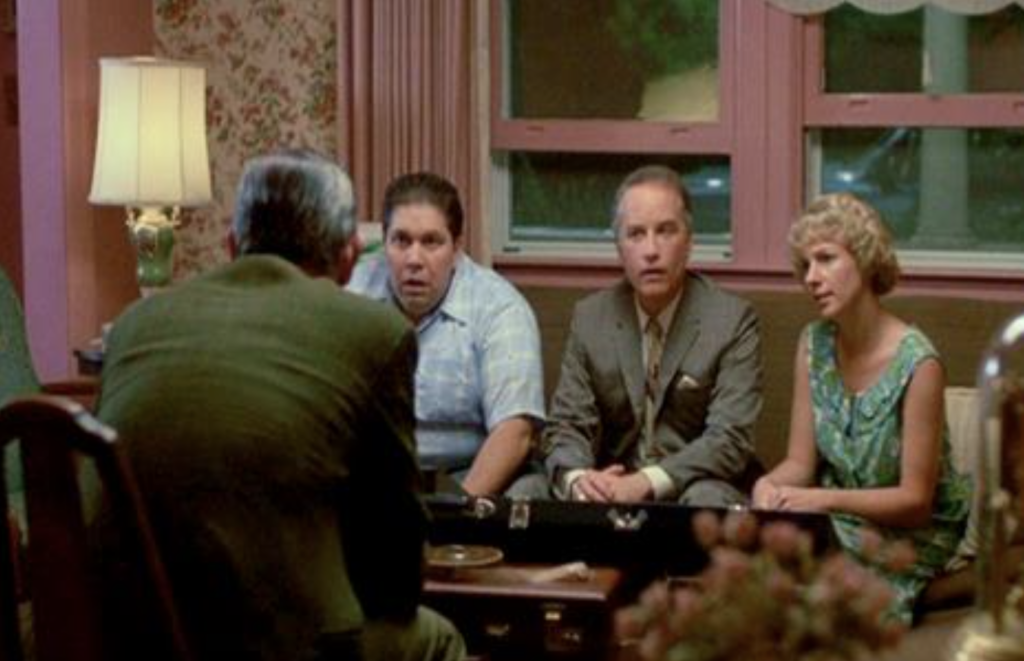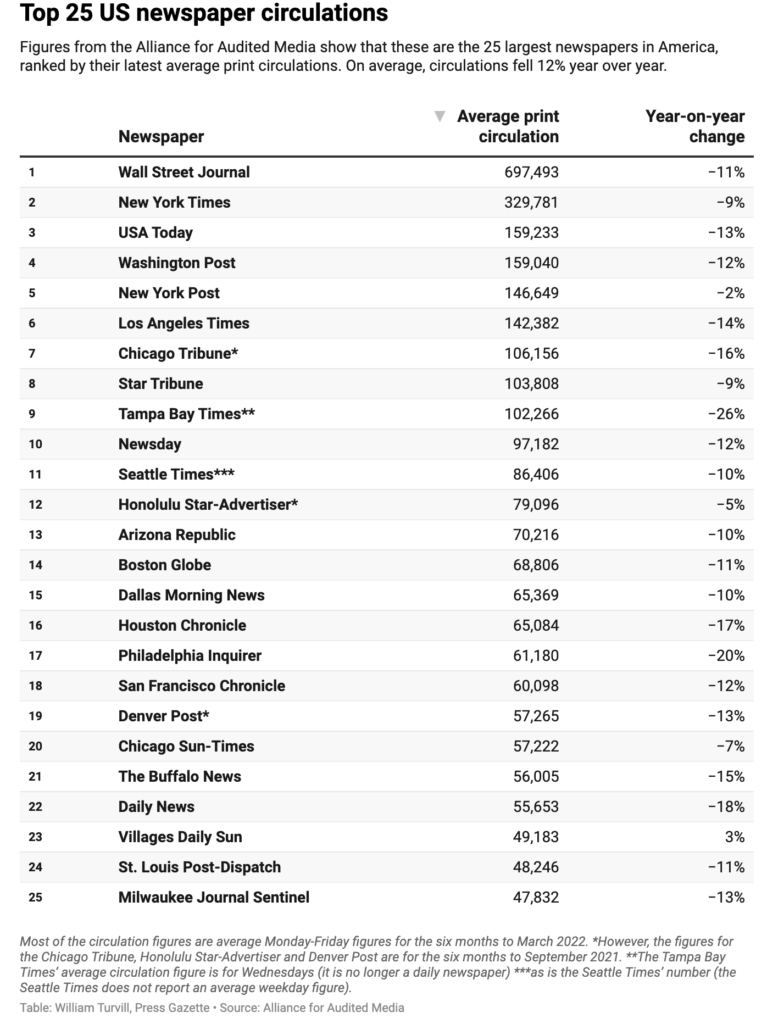If there is one thing I really like about Facebook, it’s the chance to see people who really matter to me making intelligent comments.
Whether it’s my daughter Pauline, one of my three favorite people in the world, writing about the difficulty transgendered children face in school, or my lifelong friend Mick making some of the most bizarre comments I’ve ever seen, I do like Facebook for that purpose.
Then there’s my good friend from high school, Michael Willis.

Michael has had a great career as an actor, both on stage and screen.
He has been on wonderful TV shows like “The Wire” (15 episodes), “Homicide” (nine episodes) and Law & Order (four episodes) as well as movies like “Tin Men,” “Cecil B. DeMented” and “Men in Black.”
Yesterday on Facebook, Michael posted on a subject close to my heart — the complete decline of the America press.

In Michael’s words:
“The Washington Post doesn’t want to be my paper anymore.
“They got rid of Outlook. I always put that in the “to peruse later” pile. To enjoy it in my ox-blood leather high-back Chesterfield in the library, next to a cozy fire, with a snifter of brandy and pipe of my tobacconists best blend and maybe some Aaron Copeland softly filling in the background. Well, the second sentence certainly resonates.
“The Washington Post Magazine is gone – my daughter and I did the “differences in the pictures” thing for many years, and the crossword was doable even for me. Yeah, I know they are going to move it, but being in the back of the magazine meant I wasn’t drilling holes in tissue paper and made it handy to manipulate. The Magazine ran the gamut from intriguing to dreadfully dull, and it sometimes seemed there were 4 issues of Years Best Restaurants every year, but it was familiar. Cozy.
“Part of the continuum.
“As we aged folk tend to do, I would turn to the obituaries in the back of the Metro section to see what Washingtonian might have passed. Someone who impacted our community.
“A giver to local charities, or unsung hero, a person of local notoriety, someone I might have known and had a drink with at some point in my life.
“Possibly the recognition of the life of one of the founders of our arts scene, or a firefighter who may have saved thousands of lives through volunteering and educating elementary kids about dangers in the house. You get the idea. People important to “Us”. The community. People that mattered in our lives and those around us.
“But – Those days are gone as well. I assume they’ve fired the obit staff. All they print now is about people from far away you probably never heard of that might deserve a paragraph at best to note their passing but certainly not half a page, for heaven’s sake.
“One of the “Oh, so-and-so died” you say, and the other person in the room says, “Who was that”, and you tell them and the response from both of you is “Oh” and you reach for another croissant. For example, some of those given hundreds of words in the Metro Section, none of whom had a whit to do with being Metro – A boxing referee, an heir to the British banking dynasty, a sketch artist for the New Yorker, a criminal defense lawyer known for his “sharp cross-examinations” (?), a central figure in Brazil’s Tropicalia song movement, a trusted Kennedy advisor, a California DJ.
“I’m sorry – I get carried away. There are even more obscure folk. Okay, a couple more – a NY food critic, the guy who brought Rudolph and Frosty to TV.
“Maybe it was the obsession with HUGE articles announcing the deaths – at separate times during the year of course – of Art Brewer, Tom Morey, and Bruce Meyers. All were prominent of the surfing community. Not from around here, needless to say. Dude.
“The point is – these people all got at least a 1/4 page in the Washington Post. Lotsa words from some out-a-town Jasper selling to whoever would pay them less than the other 2,740 people also submitting bios on same people no one has heard of. And nothing about those we do.
“Local arts suffer as well. I read with interest what’s new in galleries and exhibitions until I realize they are in Boston or San Francisco or London. I’m sure our theater critic is tired of Amtrak when he is so frequently sent to NY to review plays while our own Washington theaters suffer. This after 40 years of hard fought work to build the reputation of being one of the country’s leaders in theater.
“Now, The Washington Post has, IMHO, always been the clever sister who jealously lives in the shadow of her beautiful sibling, The New York Times. The Post tried harder. It challenged itself. The Post vied to be heard with different angles and scoops and insight. I don’t know how they were to work for, but my respect to the Grahams for so many years of being a great world, national AND local newspaper.
“I’m really sorry we are now in the hands of what is probably a not particularly bright man with a stray bright idea. Someone who caught this random bit of undigested beef and to his credit, turned it into billions – although at the expense of only God knows how many mom-and-pops and old bookstores and malls. I’m sure he worked hard. He certainly made a bundle.
“And he spends soooo very much of it shooting his wad of tin with a few celebrities to the edge of space.
“Note that last phrase – “the EDGE of space”. Not space. Not to the space station or the moon or high enough to drop off a satellite. Just the edge so that all these folks that paid at least $1.5M each get filmed, giddy, as they have a couple minutes without gravity and then come back and get a Bezos space medal, and talk about how wonderful he is. What a great man.
“Compared to Space X, owned by another wack job that controls our futures, Blue Origin is like an electric car that can travel 400 feet before it needs to plug in again. It adds absolutely zero when it comes to our space knowledge or even anything vaguely considered “pioneering”. Just a VERY expensive E-Ticket.
“So – I took a tangent, but one that circles back.
“By not investing in the Post to continue its’ hard earned place in the pantheon of great newspapers, Jeff is turning it into what is a bit of an upscale USA Today, I suppose. It’s becoming more generic. Unfulfilling. Less personal. Less about its long, long time readership and relationship with us, the Metropolitan area. So much less classy or interesting.
“I guess like the guy that owns it.”

This is a subject that breaks my heart. Newspapers, especially the ones you can have and fold, are disappearing and may be gone completely in another 15-20 years. If you look at the circulation numbers from last year, you’ll see that 24 of the 25 biggest circulated papers lost numbers last year.
The only one that didn’t was No. 24, the Villages Daily Sun, which is a paper in the massive Florida retirement community north of Orlando. Dare I say, a community in which everyone is older and still cares about having an actual paper newspaper.
Only nine newspapers have circulations of 100,000 or more, and former national leader USA Today has fallen from more than 2.2 million to less than 160,000. The largest paper than isn’t truly national is Michael’s Washington Post, which has gone from more than a million to less than 160,000.

Look at the Boston Globe, one of America’s greatest papers, in 14th place at 68,806. Wonderful newspapers like the Atlanta Journal-Constitution and the Charlotte Observer aren’t even on the list.
Why the incredible decline? There are actually two reasons.
First and foremost, there are now two generations of potential readers that never acquired the habit of reading newspapers. My two children, who are 42 and 37, have never had newspapers delivered although they are both consumers of news on the Internet.
Second is that most newspapers have de-emphasized the paper edition and prioritized online editions. The problem with that is that it’s more difficult to monetize.
One of the first papers to go to an online-only edition was the Seattle Post-Intelligencer, which discontinued its print edition more than 15 years ago. The scary effect of that was that the paper cut its editorial staff (reporters, editors and photographers) from 166 to 30.
How do you cover a city like Seattle with 30 people?
It’s a rhetorical question.
You don’t.
One thing that is killing newspapers is the loss of classified advertising. Between things like Craigslist and other sites online, people stopped feeling like they needed to pay for classified ads. That used to be a huge cash cow for newspapers.
So to my good friend Michael Willis, you are absolutely correct. The Washington Post really doesn’t want to be your newspaper any more, although they will be happy to be your online source of news.
The Post is one of mine — for $99 a year.
One more thing, my old friend, although it’s off topic.
Happy 40th wedding anniversary next Sunday.
Not everything good goes away.
